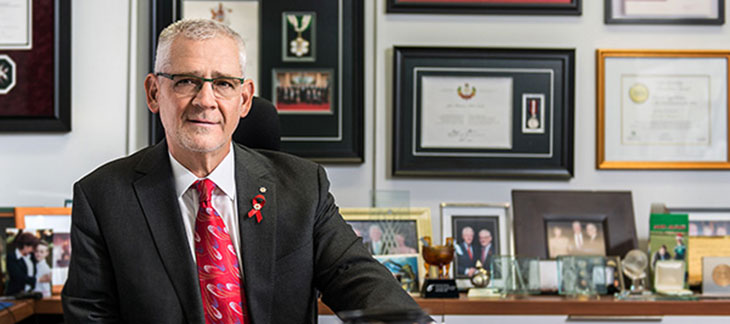Tickets (free of charge) are required
Over the past 30 years, HIV/AIDS has been transformed from a certain death sentence into a manageable disease through sustained, lifelong treatment – thanks in large part to the work of Dr. Julio Montaner and his team at the BC Centre for Excellence in HIV/AIDS (BC-CfE).
In 2006, Dr. Montaner built on his development of a new drug combination to prevent HIV from evolving into AIDS by introducing the innovative concept of Treatment as Prevention or TasP. This strategy reaches out and engages with individuals living with HIV earlier, to provide sustained treatment and care. While the concept of TasP was initially regarded as controversial, it has led to a stunning reduction of new HIV and AIDS cases in British Columbia.
Could this success in medical innovation be the key to a sustainable healthcare system?
As part of the UBC University Killam Professor Lecture Series, we invite you to join Dr. Montaner in an engaging discussion on how TasP could be instrumental in creating a more sustainable healthcare system by applying its principles to communicable diseases such as hepatitis C, and even socially communicable diseases like addiction.
An informal reception will follow the presentation and discussion.
This event is presented by UBC’s Office of the VP Research and Office of the Provost & VP Academic in partnership with the Peter Wall Institute for Advanced Studies and Alumni UBC.
About the Speaker:
Dr. Julio Montaner has dedicated the last 30 years of his life to improving the care and treatment of people living with HIV/AIDS. He helped establish the efficacy of highly active antiretroviral therapy (HAART), and pioneered ‘Treatment as Prevention’ using HAART to decrease morbidity, mortality and HIV transmission. Among other roles, Dr. Montaner is currently a professor and head of the Division of AIDS at UBC, and the director of the BC Centre for Excellence (BC-CfE) in HIV/AIDS.
Dr. Montaner was the principal investigator of an international 1996 study showing a cocktail combination of drugs known as HAART, or “highly active anti-retroviral therapy”, to be the most effective way to prevent HIV from evolving into AIDS. He followed this work with the forward-thinking TasP strategy. Based on scientific evidence, Dr. Montaner showed sustained and consistent HIV treatment leads to undetectable viral loads, boosting quality of life and longevity for patients while rendering the chances of HIV transmission negligible. He advocated for expanding access to testing and for providing universal access to anti-retrovirals immediately following an HIV diagnosis.
B.C. is the only province to have implemented TasP, with support from the Government of British Columbia, and the only one to have seen a consistent decrease in new HIV cases. TasP forms the foundation of a UNAIDS/United Nations global strategy to achieve an AIDS-free generation by 2030. Many other countries and jurisdictions worldwide have adopted the made-in-BC strategy, recognizing its potential to improve health outcomes and relieve the burden of the disease on affected individuals and the entire social fabric. Not only does TasP save lives, it also saves money by reducing costly cases of illness.
About UBC’s University Killam Professorships and the Killam Trusts:
The highest honour UBC can confer on a faculty member, a University Killam Professorship recognizes exceptional teachers and researchers who are leaders in their fields, and who have recieved international recognition for their talents and efforts.

In Canada, the Killam name is synonymous with excellence in advanced studies. The Killam Trusts, established by Dorothy Johnston Killam and Izaak Walton Killam, benefit The University of British Columbia, The Canada Council for the Arts, Dalhousie University, Montreal Neurological Institute of McGill University, University of Alberta and The University of Calgary.
More than 2,000 UBC professors, fellows, students and scholars have received Killam support for their research and scholarship. Every Killam scholar makes a unique contribution, creating and disseminating knowledge that has global impact.

